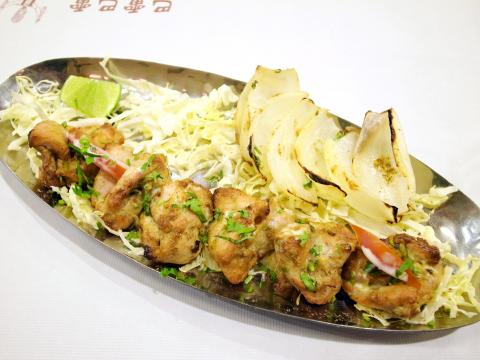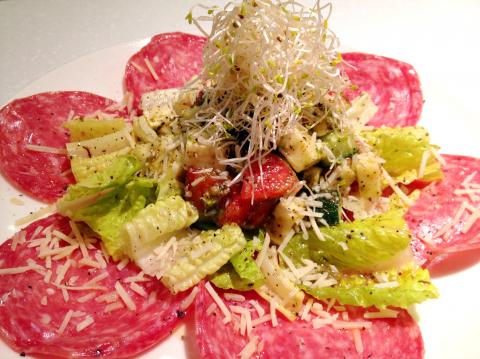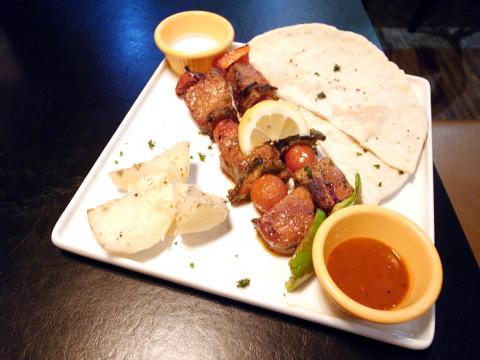Balle Balle Indian Restaurant & Bar
(巴雷巴雷印度餐廳)
Address: 12, Guangfu N Rd, Taipei City (台北市光復北路12號)

Photo: Ho Yi, Taipei Times
Telephone: (02) 2570-7265
Open: Daily from 11:30am to 2:30pm and 5:30pm to 10pm; closed on Mondays
Average meal: NT$600 to NT$800

Photo: Ho Yi, Taipei Times
Details: Menu in Punjabi, English and Chinese; credit cards accepted
Finding a really good Indian restaurant can be a difficult task in Taipei, where choices are limited not so much because of the small number of dining spots, but because of the similar, if not exactly identical, food on offer. Fortunately, progress is occasionally made with the arrival of establishments such as the Balle Balle Indian Restaurant & Bar.
The kitchen is fully devoted to cuisine from the Punjab region of northern India. Compared to the often extensive menus that have the weight of a book at similar establishments, the eatery has a diner-friendly selection of appetizers, tandoori, curry dishes and breads. Ingredients used by the restaurant’s team of Indian chefs come directly from the Indian specialty store which is the owner’s other business venture.

Photo: Ho Yi, Taipei Times
The rich flavors from the Indian subcontinent are finely rendered at Balle Balle. Take the murg malai kebab (NT$380) for example — it is composed of boneless chicken marinated with cashew paste and homemade cream and spices. The tandoori starter delights with the surprisingly tender, succulent meat, accompanied by the slightly charred, lusciously sweet onions.
From the curry section, which includes chicken, lamb, fish and vegetables, veg kofta (NT$290) features soft balls made from mashed potatoes and mixed vegetables submerged in onion and cashew gravy. Spices like ginger and coriander add punch to the delightfully creamy dish.
The gosht rahra (NT$360) delivered a wow effect with the offering of tender, boneless mutton tossed in onion gravy, making for another mild, smooth curry delicacy.
Equally reassuring is the Indian manager known as GV. Speaking fluent English and Mandarin, the manager is as friendly as he is helpful in making recommendations and answering patrons’ needs.
Merlot Cafe & Bistro
(巴夢樂小廚)
Address: 32, Ln 76, Xinsheng N Road Sec 2, Taipei City (台北市新生北路二段76巷32號)
Telephone: (02) 2568-1283
Open: Tuesday to Sunday from 5:30pm to 10pm
Average meal: NT$800 to NT$1,000, 10 percent service charge
Details: English and Chinese menu; credit cards accepted
Experiencing a city on a weekend or over a lifetime inevitably spells great differences. For long-time residents of Taipei, life doesn’t only involve going to Taipei 101 or dining at Din Tai Fung (鼎泰豐). At first glance, Merlot Cafe & Bistro is one of such places that can simply fall off the radar — or never appear in the first place. Ranked No. 1 on TripAdvisor among 8,865 restaurants in Taipei, the intimate bistro is a well-guarded secret among foreign visitors to the city, with relatively little coverage from local food bloggers and journalists. But a closer look reveals something that we all look for in a place to eat, drink and be merry — quality food and a friendly host who knows his customers by their first names.
Small, homey and hidden away in a back alley off the bustling Linsen North Road (林森北路), the establishment appears modest. The interior is neat, clean and has a seating capacity for 20 diners. Often, the smell of food being prepared wafts up from the open kitchen, while Bob Chau (), the gracious Taiwanese-American host from California, glides between tightly packed tables, chatting with patrons about everything from food to life.
Much like the cordial service, Chau’s cooking is also a hearty fare. The lauded chargrilled steak (8oz, NT$490) with sauteed seasonal vegetables is cooked medium-rare to medium and sliced thin. The seasoned beef is as tender and juicy as a good piece of meat should be.
Featuring handmade pastas, Merlot’s kitchen offers a satisfying selection of the Italian staple. Meanwhile, Chau’s rendition of risotto is comfortingly soft, smooth and cooked to a creamy consistency.
YiamasGreeka Taverna
(亞馬仕希臘餐廳)
Address: 3, Ln 181 Anhe Rd Sec 2, Taipei City (台北市安和路二段181巷3號)
Telephone: (02) 2737-0037
Open: Monday to Friday from 11:30am to 3pm and 5:30pm to 11pm, Saturday and Sunday from 11:30am to 11pm
Average meal: NT$500 to NT$800
Details: Menu in Chinese and English, credit cards accepted
On the premises where Toast Bar and Bistro used to stand, Yiamas Greeka Taverna brings a taste of Greece to a neighborhood dominated by Western-style restaurants such as Carnegie’s and Whalen’s. Ambience-wise, the dimly lit restaurant has an intimate, relaxing comfort of a bar, accentuated by a slick palette of wooden brown, dark gray and white. Fluent in Mandarin and English, the wait staff appear both relaxed and attentive. With little knowledge of Greek cuisine, my dining companion and I relied on our server to make recommendations, which turned out to be just as delicious as promised.
One of the highlights is the souvlaki. Served with homemade pita bread, yogurt garlic dressing and roasted potatoes, Yiamas’ rendition of souvlaki features chicken (NT$290), lamb (NT$350) and beef tenderloin (NT$350). The beef we tried was flavorful and went well with the caramelized bell peppers and onions, though the meat seemed to be cooked to the level of medium-well rather than medium that we ordered. The yogurt garlic dressing was good, but in my opinion, the well-flavored, grilled delight needs no other seasoning than the slices of lemon served on the side.
Another highly recommended dish is the kotoupolo lemonato (NT$380), or Greek roasted chicken. Seasoned with lemon, oregano and garlic, the bird was roasted to a succulent, tender perfection, while the fruity, sour fragrance of the lemon wonderfully complemented the otherwise rich plate. The large serving — half a chicken — is best shared among a group.
Good food and drinks aside, Yiamas also hosts comedy nights on a regular basis.

Most heroes are remembered for the battles they fought. Taiwan’s Black Bat Squadron is remembered for flying into Chinese airspace 838 times between 1953 and 1967, and for the 148 men whose sacrifice bought the intelligence that kept Taiwan secure. Two-thirds of the squadron died carrying out missions most people wouldn’t learn about for another 40 years. The squadron lost 15 aircraft and 148 crew members over those 14 years, making it the deadliest unit in Taiwan’s military history by casualty rate. They flew at night, often at low altitudes, straight into some of the most heavily defended airspace in Asia.

Beijing’s ironic, abusive tantrums aimed at Japan since Japanese Prime Minister Sanae Takaichi publicly stated that a Taiwan contingency would be an existential crisis for Japan, have revealed for all the world to see that the People’s Republic of China (PRC) lusts after Okinawa. We all owe Takaichi a debt of thanks for getting the PRC to make that public. The PRC and its netizens, taking their cue from the Chinese Communist Party (CCP), are presenting Okinawa by mirroring the claims about Taiwan. Official PRC propaganda organs began to wax lyrical about Okinawa’s “unsettled status” beginning last month. A Global

Taiwan’s democracy is at risk. Be very alarmed. This is not a drill. The current constitutional crisis progressed slowly, then suddenly. Political tensions, partisan hostility and emotions are all running high right when cool heads and calm negotiation are most needed. Oxford defines brinkmanship as: “The art or practice of pursuing a dangerous policy to the limits of safety before stopping, especially in politics.” It says the term comes from a quote from a 1956 Cold War interview with then-American Secretary of State John Foster Dulles, when he said: ‘The ability to get to the verge without getting into the war is

Like much in the world today, theater has experienced major disruptions over the six years since COVID-19. The pandemic, the war in Ukraine and social media have created a new normal of geopolitical and information uncertainty, and the performing arts are not immune to these effects. “Ten years ago people wanted to come to the theater to engage with important issues, but now the Internet allows them to engage with those issues powerfully and immediately,” said Faith Tan, programming director of the Esplanade in Singapore, speaking last week in Japan. “One reaction to unpredictability has been a renewed emphasis on